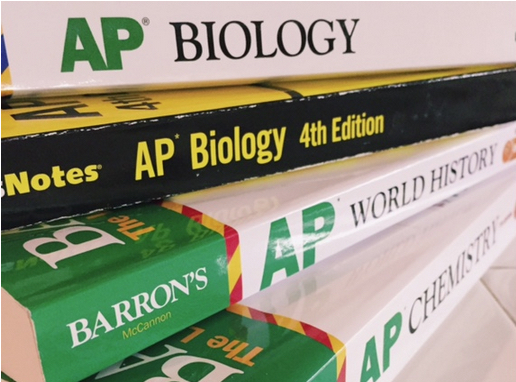![Review books made by companies like Barron’s or Cliff Notes can be excellent aids for studying for the AP test. [Linda Lee]](http://www.jstudentboard.com/reporter/wp-content/uploads/2015/04/JSR_Apr18_APBooks.jpg)
AP classes are rigorous college-level courses offered to high school students who wish to challenge themselves. They are seen as widely beneficial since they can cultivate efficient study habits and prepare students for college. In addition, they can boost grade point averages (GPAs), which determine class rank. Passing AP tests, which are made to assess understanding and mastery of the course material, grants college credits to students.
“AP classes are really difficult, but they’ve certainly enriched my high school education,” said Christy Tak, a sophomore at Valencia High School who has taken four AP courses, in an interview with JSR.
Tak continued, “I admit that I was jealous of other students who went out everyday while I was studying for my AP test, but it’s unbelievably satisfying when you receive the passing score. I think it’s completely worth it.”
Due to the rigorous nature of AP tests, companies such as Barron’s, Princeton Review, and Kaplan have produced review books and study aids to help students succeed. These books compress the course material into briefer segments, making it easier for students to review for the AP test within a short timeframe.
Because of the high demand for study materials, there is a fierce competition in the AP review business. This often makes it difficult for students to choose which brand to use, as there are notable differences between brands.
Barron’s, one of the leading publishers, extensively covers the study material with thorough detail and provides very difficult practice tests.
“Personally, I think Barron’s is the best and most comprehensive study book because even though they do give a little more info than needed, it’s always enough to pass the AP test and excel… I would recommend it for those who do need a lot of help reviewing, especially for social studies/history tests,” explained Tori Alandy, a junior at Valencia High School, in an interview with JSR.
Other companies, such as Princeton Review and Kaplan, cover the information more concisely and can be more user-friendly.
Alandy, who has taken seven AP courses in total, said, “Princeton Review is nice and very compact and concise, but I would only use it for subjects I’m already confident in. I don’t like Cliff Notes as much because it literally feels like a textbook to me. The only other brand I’ve used is 5 Steps to a 5, and it was a speedy review that was good enough for me to pass the AP Chemistry test.”
Although it appears to be quite daunting at first glance, the AP test is a rewarding ending to a challenging education. AP season is well underway, and students who haven’t started studying should begin as soon as possible – regardless of the brand of review books they choose.

